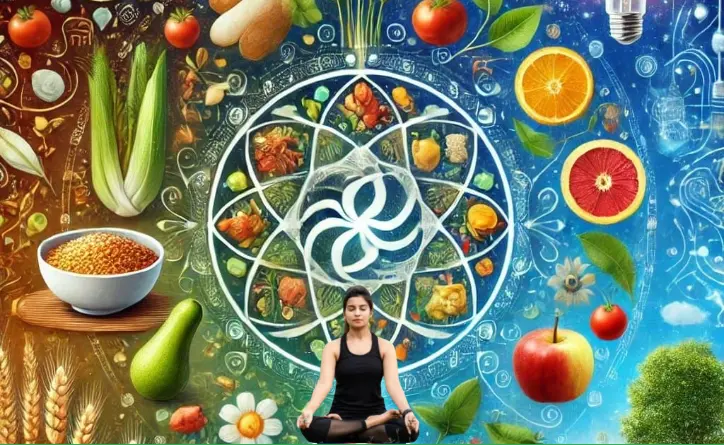
Last week, I met a Yoga practitioner in Rishikesh whose insights prompted me to reflect on some misguided practices in our lives. While we often focus heavily on diet to stay healthy, other crucial factors beyond food contribute to our overall well-being and happiness. Our lives today are frequently marked by stress, chaos, and imbalanced routines, making balance and harmony seem elusive. However, the ancient wisdom of Aahar, Vihar, and Vichar provides a roadmap to achieve this. Integrating these three key principles—Aahar (food), Vihar (lifestyle), and Vichar (thoughts)—helps cultivate a sense of fulfillment and well-being.
To understand these concepts more clearly, let’s break them down individually. Aahar refers to the food we consume to nourish our bodies. It emphasizes the importance of eating wholesome, nutritious, and balanced meals, promoting mindful eating and savoring each bite. Recognizing the connection between our food choices and our overall well-being is essential. Food is not just fuel for the body but also a source of nourishment and vitality.
‘Aahar’ extends beyond just food; it encompasses everything you take—what you eat, the words you hear, the things you see—everything that enters your senses. Being mindful of all these intakes is crucial, as they profoundly affect us as individuals. Our modern life is inundated with information from advertisements, banners, billboards, news channels, and social media platforms like Instagram, Facebook, and YouTube. Much of this is irrelevant and does not add value to our knowledge, leading to mental overload. To keep our minds clutter-free and more productive, it’s essential to avoid addiction to these mediums. In a nutshell, be mindful of everything your senses are absorbing.
Secondly, let’s consider our ‘vihar.’ Vihar includes our lifestyle choices—activities, exercise, sleep patterns, and daily routines. Regular physical activities like yoga help maintain physical fitness and flexibility while reducing stress and promoting mental well-being. It also encourages adequate rest and sleep, which are crucial for the body’s rejuvenation and restoration. Practices such as meditation and controlled breathing are also essential. A well-structured daily routine, aligned with natural circadian rhythms, fosters stability and supports overall health and vitality.
A sedentary lifestyle is harmful for everyone, regardless of age. Many people think they have worked enough and it’s time to rest. However, to live an independent, happy, and healthy life in your later years, it’s crucial to stay active every day as long as your body allows. Ensure you get proper rest and sleep on time, and strive to remain stress-free. By maintaining a more active routine, your body will adapt, allowing you to enjoy your golden years with greater enthusiasm and contentment.
Thirdly, consider your ‘vichar,’ which means your thoughts, beliefs, and mental disposition. How you feel is entirely dependent on your mindset. Maintaining a positive outlook and feeling good about yourself leads to happiness and health. Your thoughts profoundly influence your overall well-being. Positive and constructive thinking patterns foster emotional resilience, mental clarity, and a sense of inner peace. Practicing mindfulness and cultivating gratitude, compassion, and self-reflection help nurture a positive mindset.
Aahar, Vihar, and Vichar emphasize the importance of a balanced and harmonious lifestyle. Here are some tips for each:
Aahar:
• Eat a balanced diet rich in fruits, vegetables, and whole grains.
• Avoid processed foods, sugary drinks, and excessive meat consumption.
• Practice mindful eating and savor your food.
• Be mindful of everything you consume—food, words, images, and information—as it all impacts your well-being.
Vihar:
• Spend time in nature.
• Engage in regular exercise and ensure adequate sleep.
• Create a peaceful and relaxing home environment.
• Incorporate yoga or meditation into your routine.
Vichar:
• Cultivate positive thoughts.
• Practice gratitude for what you have.
• Forgive others and yourself.
It’s evident that well-being extends beyond just dietary choices. “Health is wealth,” and this wealth is built through mindful consumption (aahar), an active lifestyle (vihar), and positive thoughts (vichar). By paying attention to what our body takes in, staying physically active, and maintaining a positive mindset, we can achieve a balanced and fulfilling life. As the saying goes, “A healthy outside starts from the inside.” Embracing these holistic principles not only enhances our physical health but also enriches our mental and emotional well-being. The moral is simple: by nurturing our body, mind, and spirit, we can truly thrive at any age.

Recent Comments